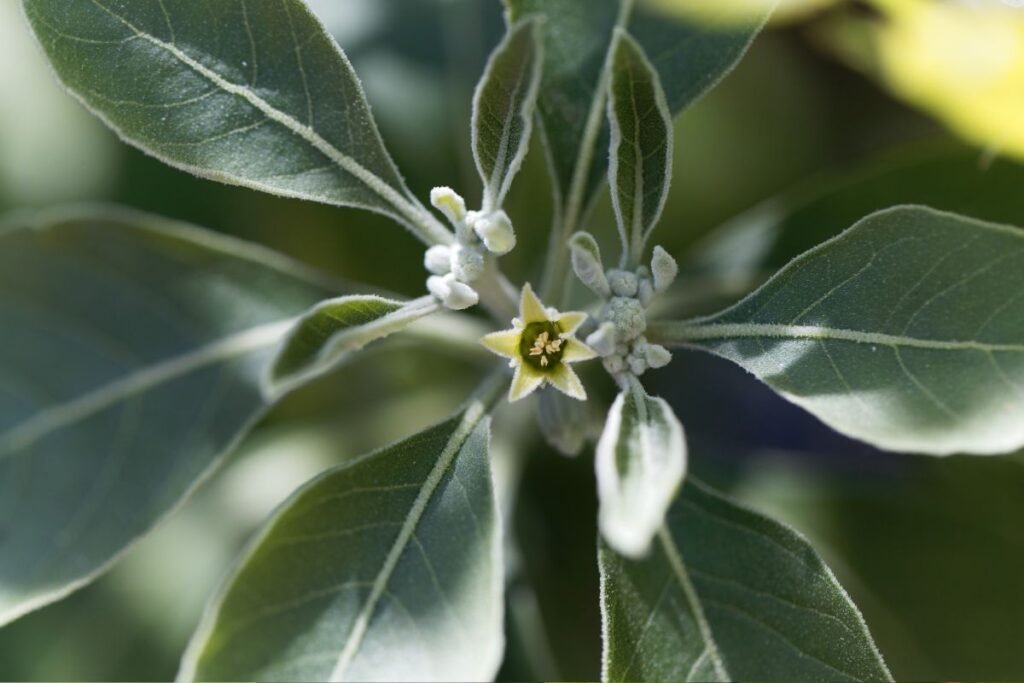Ashwagandha (Withania somnifera) is a plant belonging to the nightshade family (Solanaceae), naturally found in India, the Middle East, and certain regions of Africa. Due to ashwagandha tea benefits, this plant is becoming increasingly known in many world countries, where ashwagandha tea is also gaining popularity.
The name Ashwagandha derives from two Sanskrit words — ashva, meaning ‘horse,’ and gandha, meaning ‘smell.’ This meaning reflects the plant’s characteristic scent, which is strong and not particularly pleasant. The botanical name ‘somnifera’ translates as ‘sleep-inducing,’ highlighting the plant’s calming and relaxing effects.
Ashwagandha is an evergreen perennial shrub, which grows to a height of 35–75 cm. The plant has pale green leaves elliptical, and about 12 cm long. The plant produces small, green, bell-shaped flowers and bears orange fruits resembling rose hips. However, these fruits are inedible and are sometimes referred to as “poisonous gooseberries.”
People use the roots and leaves of ashwagandha for health-promoting purposes. People in the regions where the plant naturally grows use ashwagandha fresh and dried. In other European countries, ashwagandha is most commonly available in the form of ready-to-use products sold in stores — typically powders made from its roots and leaves—while dried whole roots are less commonly used.

Ashwagandha Tea Benefits and Medicinal Properties
The use of ashwagandha for therapeutic purposes is primarily associated with traditional Eastern medicine. It is one of the most popular plants used in Ayurveda, sometimes called ‘Indian ginseng.’ Traditionally, folklore people use this plant to support physical endurance, enhance energy levels, and promote emotional balance. Ashwagandha is unique due to its adaptogenic nature — meaning it may help the body adjust to individual needs, stimulating or calming the organism, depending on the condition.
The medicinal effects of ashwagandha have also attracted the attention of modern medical science. However, scientists substantiated only some of the claims originating from traditional medicine. Nonetheless, several health areas monitored the benefits of ashwagandha tea:
- Due to the antioxidant compounds present in its roots, ashwagandha may help strengthen overall body vitality. It can also promote faster recovery after physical exertion, stress, or illness.
- It may reduce cortisol — the so-called stress hormone — thereby alleviating symptoms of stress and anxiety.
- Ashwagandha is one of the most potent natural aphrodisiacs in the world. It may help support the reproductive health of men and women and ease certain menopausal symptoms, such as mood swings, hot flashes, and anxiety.
- It may help relieve symptoms of depression and support individuals with certain mental health disorders.
- Ashwagandha improves long-term memory and has a promising natural aid in the prevention of age-related cognitive decline, including Alzheimer’s disease and dementia.
- It may help regulate sleep cycles and treat insomnia.
Consumption of Ashwagandha Tea
People often described the taste of ashwagandha tea as ‘earthy.’ Indeed, this tea has a distinctive, slightly bitter flavor with a characteristic earthy aftertaste. For this reason, people often enhance ashwagandha tea with various natural additives — fruits, berries, spices (such as cinnamon, cardamom, or cloves), or honey — to improve its taste.
It is recommended to drink one cup daily for six months to achieve the desired therapeutic effects of ashwagandha tea. Afterward, experts advise a three-month break before resuming another six-month cycle.
You also can prepare ashwagandha tea using commercially available products: dried ashwagandha roots (either loose or in tea bags) or powder.

Preparation of Ashwagandha Tea
Brew ashwagandha tea in a similar way to any other herbal tea. Simply pour freshly boiled water over an ashwagandha tea bag, or add 1 teaspoon of dried ashwagandha root or powder. You can drink the tea after a few minutes of steeping on its own, or with your favorite additives.
If you prefer to extract more of the plant’s therapeutic properties, simmer the ashwagandha root over low heat for 10–15 minutes after adding it to boiling water. Once cooled slightly, the tea is ready for consumption.
Ashwagandha Root Tea Recipe
Ingredients:
- a cup of water
- 1 teaspoon of dried ashwagandha root
Add the ashwagandha root to boiling water and simmer over low heat for 10 minutes. Strain before drinking. You may add natural flavorings such as honey, cinnamon, or lemon.
You also may try to prepare a larger quantity of tea and store it for up to a couple of days in the refrigerator. When making a larger batch, it is important to maintain the correct proportions—1 teaspoon of ashwagandha root per cup of water.

Ashwagandha Powder in Everyday Nutrition
As mentioned earlier, ashwagandha powder is the most commonly available form of the plant in many other countries. People value it as a versatile dietary supplement that they can incorporate into daily meals or drinks. However, due to its distinct earthy taste, use it in moderation and experiment to find the most pleasant flavor combinations.
Ashwagandha powder pairs well with hazelnuts, turmeric, berry juices, smoothies, and milkshakes.
For those struggling with insomnia, a traditional remedy involves consuming a warm milk and ashwagandha powder mixture before bedtime. To prepare this simple drink, you need to add one teaspoon of ashwagandha powder to a cup of warm milk, stir thoroughly, and drink it before sleep.
Possible Side Effects of Ashwagandha
For some individuals, ashwagandha consumption may irritate the gastrointestinal tract, which results in digestive issues such as nausea, vomiting, or diarrhea. If such symptoms occur, it is recommended to terminate ashwagandha use immediately.
Ashwagandha is not recommended for pregnant women, as it may increase the risk of premature labor. Likewise, nursing mothers should avoid using ashwagandha, as there is insufficient research regarding its safety for infants.
If you are taking medications for diabetes, blood pressure, or immune system suppression, it is essential to consult your healthcare provider before using ashwagandha.
Sources:
- https://www.healthline.com/nutrition/ashwagandha
- https://www.medicalnewstoday.com/articles/318407
- https://draxe.com/nutrition/ashwagandha-tea/
- https://senchateabar.com/blogs/blog/ashwagandha-tea
- https://en.wikipedia.org/wiki/Withania_somnifera
Cover image generated with Midjournei AI.

